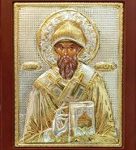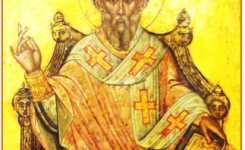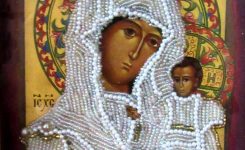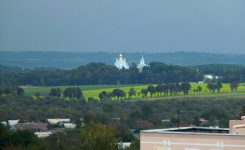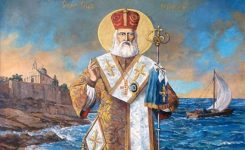monastery musings
How Does an Orthodox Christian Confront an Economic Crisis?
Download this article Return to All Articles
Foreword
In 2009, I had the privilege of being a guest at the home of Ioannis and Katerina Kallianiotis. It is always a spiritually profitable experience when I am blessed to be in the home of pious, Orthodox Christian laity. The conversation was always edifying. Ioannis shared stories of his youth on a Greek island, far from the mainland. I recalled my time in Greece, where every Sunday after the Divine Liturgy the faithful gathered in parks or homes and where they had a tradition of ‶lay theologians″ who would speak on various topics. In Ioannis, I saw the sagacity of a lay theologian.
Upon understanding his accomplishment of being published in every Mount Athos journal, I pleaded with him to write something for American Orthodox Christians. At that time the world faced the challenges of the 2008 economic crisis, so I asked him to pen an essay on how Orthodox Christians should be reacting in the crisis. He steadfastly rejected my proposition, as he had never written anything of this nature in English, only in his native Greek.
After my departure, he apparently struggled with my suggestion and came to understand, in his heart, the necessity of writings on this topic available to English-language speakers. I was surprised when I received from him a lengthy article. Upon reading it, I understood why he had hesitated; it was clear that it was challenging for him to communicate in English certain theological concepts as they related to economics. While I felt the article had much to offer, there was much of it that I could not grasp. Then I was diverted in caring for a nun with a terminal illness, and this article ended up buried in a file.
Recently, I recalled the treasury of unpublished materials stored in boxes and this article came to mind. I realized it would be just as relevant now, in the Covid-19 economic crisis, as it was then. After much searching, I found the article and reworked it. I believe it offers fresh insight into an age-old problem and is even prophetic in areas that we now face.
Dr. Kallianiotis says that mankind operates on cycles; Righteous Joseph, in ancient Egypt, through God’s grace understood that. He urges us to develop an Orthodox phronima (φρόνημα: mindset, outlook) and to see where we, as citizens, individuals, and Orthodox Christians stand in regard to our being able to weather these cycles. It is an honor for the Queen of All Skete to publish this article.
Mother Andrea
About the author
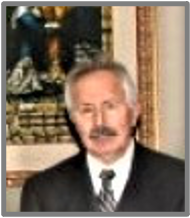 Dr. Ioannis (John) N. Kallianiotis is a professor of Finance at The Arthur J. Kania School of Management, University of Scranton in Pennsylvania. He earned his B.A. in Business Economics from the Aristotelian University of Thessaloniki, Greece (1978); M.A. in Business Economics from Queens College, New York (1982); M.Phil. in Financial Economics from The Graduate Center of The City University of New York (1984); and was awarded a Ph.D. in Finance (International Finance and Monetary Theory & Financial Institutions) from City University of New York Graduate Center/Baruch College (1985).
Dr. Ioannis (John) N. Kallianiotis is a professor of Finance at The Arthur J. Kania School of Management, University of Scranton in Pennsylvania. He earned his B.A. in Business Economics from the Aristotelian University of Thessaloniki, Greece (1978); M.A. in Business Economics from Queens College, New York (1982); M.Phil. in Financial Economics from The Graduate Center of The City University of New York (1984); and was awarded a Ph.D. in Finance (International Finance and Monetary Theory & Financial Institutions) from City University of New York Graduate Center/Baruch College (1985).
In addition to work in the private sector in accounting, banking and research, he has served as professor at nine colleges and universities. Prior to this he was an officer in the Greek Army, assigned to a NATO base for three years. He has been married for 45 years and has one son. A pious Orthodox Christian, he is involved in his church. He has also served as president or on the boards of various academic, professional, community, charitable, and spiritual societies and associations across America and around the world.
He is acclaimed as an authority on International Finance, Financial Markets, the European Union, and Business in general, having published more than 350 articles in leading international monetary and business journals. He has been interviewed by many media, including the World Politics Review, The Washington Times, U.S. News & World report, Reuters, Huffington Post, The Wall Street Journal and others. His works are included in many books, conference proceedings, journals, and pamphlets. In addition to co-authoring a number of books, he authored some individually, including: Exchange Rates and International Financial Economics: History, Theories, and Practices (Palgrave/Macmillan, 2013); International Financial Transactions and Exchange rates: Trade, Investment, and Parities (Palgrave/Macmillan, 2013); and The European Union and its Debt Crises: The Deception of the Greeks (Nova Science Publishers, 2018).
In addition to his work in the field of economics, he is published extensively in other areas, including Orthodox Christianity, history, philosophy, culture, education, Greek language, and other topics. In this area, he is published in: Orthodoxos Typos, Salpigx Orthodoxias, Ekklisiastiki Paradosis, Dimosiographiki, Agios Kyprianos, Orthodox Tradition, Ellinochristianiki Agogi, Agios Agathagelos, Voanerges, Hellas on the Web, Antibaro, Christian Vivliografia, Serbia Martira (Romania), Macedonia Hellenic Land, Hellenes Online, Opera Mundi (Brazil), Krufo Sxoleio, Apologitika, Orthopraxia, Metemorphothis, and elsewhere. Some of the interesting subject choices include: ‶From the Old `Holy Roman Empire´ to its Anabiosis with the Illuminati’s `Creature´ the European Union″ (2019); ‶The Suspicious Global Economic and Political Crises for Controlling the `Disobedient´ Orthodox Nations″ (2016); ‶Globalization and its Fight to Be Inflicted on Orthodox Nations″ (2014); and ‶The Intended Dissolution of the Intellectual and Spiritual Hellas″ (2013).
cVd
How does an Orthodox Christian confront an economic crisis?
Ioannis N. Kallianiotis, Ph.D.
Prologue
A crisis (from the Greek word κρίσις – krisis; plural: κρίσεις ‶crises″) is any event or situation that is unstable and dangerous. It may affect an individual, group, community, whole society, a country or the world. Crises are deemed to be negative changes in security, economic, political, social or environmental affairs, especially when they occur abruptly, with little or no warning. More loosely, it is a term meaning ‶a testing time″[1] or an ‶emergency event″.[2]
Crisis is the situation of a poorly functioning complex system (individual, family, economy, society, nation, or world). When a crisis occurs, an immediate decision is necessary. Ideally, we should follow God’s Law and the advice of our holy fathers (our Orthodox traditions) to help each other in times of crisis. ‶And we urge you, beloved to admonish the idlers, encourage the faint hearted, help the weak, be patient with all of them. See that none of you repays evil for evil, but always seek to do good to one another and to all. Rejoice always, pray without ceasing, give thanks in all circumstances; for this is the will of God in Christ Jesus for you. Do not quench the Spirit. Do not despise the words of prophets, but test everything; hold fast to what is good; abstain from every form of evil″.[3]
Thus, crises can stem from natural influences affecting a complex system or they can be planned by humans, who have become instruments of the enemy of humanity. A specific crisis may be a crisis of moral and ethical values, a natural crisis, an economic or political crisis, or even a spiritual crisis (perhaps the most serious of all). A system in crisis is operating poorly. The system still functions, but it causes enormous pain, suffering, and losses (of goods, wealth, lives, and even souls).
In the case of the current national crisis, an immediate decision is necessary to stop the further disintegration of the system. Strict regulations are necessary to prevent a new crisis from occurring. For the Orthodox Christians, the immediate treatment is the hope that his faith gives to him after repentance and prayer. Of course, the causes of this particular crisis are numerous. Some of them may elude us or may even be designed to control and terrorize people, therefore making it impossible to take a rational, informed decision or to have the means and power to confront and reverse the situation. But we must know ‶…strive first for the kingdom of God and his righteousness, and all these things will be given to you as well.″.[4]
Generally speaking, people would prefer to keep any comfortable status quo going for as long as possible. Their reluctance to understand the nature of balance and control, booms and busts and countercyclical policies makes it difficult for them to anticipate sudden reversals. Humans are risk averse and they like stability, safety, and prosperity. Of course, Orthodox Christians also like all these virtues. However, they must always be mindful of their salvation.[5]
History of Crises
Going back in history, we have the reality of nature and things that we call ‶real″. One of the forces of nature we strive to understand is the nature of cycles (waves). Day and night cycles, lunar cycles, seasonal cycles are all at the very basis of human philosophy, physics, economics, religion, and civilization. The Holy Bible says, ‶Now there came a famine throughout Egypt and Canaan, and great suffering, and our ancestors could find no food″.[6]
The notion of waves or the idea that things have cycles is an ancient one. Many stories told for thousands of years attempt to illustrate how governments or policy makers ought to cope with these inevitable cycles of drought and rain, plenty and famine, wealth and poverty. Likewise, cycles of dynastic growth and dying empires or cycles of economic growth and recessions or depressions are recounted throughout history.
Let us recall one of the oldest Bible stories related to these business cycles: The Seven Fat Cows and the Seven Starving Cows and also the Seven Good Heads of Grain and the Seven Empty Heads of Grain. This is more than an interesting story; it is a true event. The agricultural production followed a seven-year cycle directly impacting the prosperity of the day. Furthermore, wise ‶saving″ allowed for prudent ‶spending.″ This practice is very ancient, as old as civilization itself. The earliest empires knew that they had to accumulate wealth during good times and spend it during bad times.
It happened at the end of two full years that Pharaoh dreamed: and, behold, he stood by the river. Behold, there came up out of the river seven cattle, well-favored and fat-fleshed, and they fed in the reed-grass. Behold, seven other cattle came up after them out of the river, ill-favored and lean-fleshed, and stood by the other cattle on the brink of the river. The ill-favored and lean-fleshed cattle ate up the seven well-favored and fat cattle. So Pharaoh awoke. Joseph said to Pharaoh, ‶The dream of Pharaoh is one. What God is about to do he has declared to Pharaoh. The seven good cattle are seven years; and the seven good heads of grain are seven years. The dream is one. The seven lean and ill-favored cattle that came up after them are seven years, and also the seven empty heads of grain blasted with the east wind; they will be seven years of famine. Now therefore let Pharaoh look for a discreet and wise man, and set him over the land of Egypt. Let Pharaoh do this, and let him appoint overseers over the land, and take up the fifth part of the land of Egypt’s produce in the seven plenteous years. Let them gather all the food of these good years that come, and lay up grain under the hand of Pharaoh for food in the cities, and let them keep it. The food will be for a store to the land against the seven years of famine, which will be in the land of Egypt; that the land not perish through the famine.″ The thing was good in the eyes of Pharaoh, and in the eyes of all his servants. Pharaoh said to his servants, ‶Can we find such a one as this, a man in whom is the Spirit of God?″ Pharaoh said to Joseph, ‶Because God has shown you all of this, there is none so discreet and wise as you. You shall be over my house, and according to your word will all my people be ruled. Only in the throne I will be greater than you.″ Pharaoh said to Joseph, ‶Behold, I have set you over all the land of Egypt.″ Pharaoh took off his signet ring from his hand, and put it on Joseph’s hand, and arrayed him in robes of fine linen, and put a gold chain about his neck, and he made him to ride in the second chariot which he had. They cried before him, ‶Bow the knee!″ He set him over all the land of Egypt. Pharaoh said to Joseph, ‶I am Pharaoh, and without you shall no man lift up his hand or his foot in all the land of Egypt.″ Joseph laid up grain as the sand of the sea, very much, until he stopped counting, for it was without number. The seven years of plenty that was in the land of Egypt, came to an end. The seven years of famine began to come, just as Joseph had said. There was famine in all lands, but in all the land of Egypt there was bread. When all the land of Egypt was famished, the people cried to Pharaoh for bread, and Pharaoh said to all the Egyptians, ‶Go to Joseph. What he says to you, do.″ All countries came into Egypt, to Joseph, to buy grain, because the famine was severe in all the earth.
Genesis 41:1-57
Thus, we can see that there are cycles for saving and cycles for spending. Generally speaking, wise people save during good cycles and spend their savings during bad cycles. But, data in the U.S. shows that Americans borrow and spend during good cycles (periods of growth) and save during bad cycles (periods of recession) because the crisis wakes them up.
Unfortunately, a lot of people misunderstand the concept of saving, which is a necessary economic virtue. They believe that savers are hoarders. In fact, saving is the basis of our self-sufficiency and of all lending systems.
III. Today’s Crisis
Due to globalization, present and future financial crises are unlikely to be limited to regions or nations. Rather, the contagion effect of such events will influence the financial balance of the world as a whole.
While many people may bewail the collapse of the easy credit cycle (the liquidity bubble) and the irrational exuberance of the ‶boom″ years, we must realize that this way of life was unsustainable. The United States, through its central bank (The Fed), is trying to fix the end of the flood of easy credit by giving itself even more easy credit and then giving it out to others so they can lend more… Clearly, this system is not going to work. The more we refuse to balance things, the more out of balance they become. This, in turn, requires more effort to keep the out of balance things running. The cycle has become vicious with huge fluctuations resulting in enormous social costs for individuals and nations.
Unemployment is the worst consequence of an economic crisis as it may lead to foreclosure, homelessness, mental stress and a general degradation of self and family. Lacking a job often means lacking social contact with fellow employees and a lack of self-esteem, possibly leading to further alienation from our fellow man. Self-esteem is a judgment of oneself; it is the sum of self-confidence (a feeling of personal capacity) and self-respect (a feeling of personal worth). As Orthodox Christians we must remember that we are created in God’s image making each of us an icon of God. We must have self-respect and respect for all of creation as children of God. According to Jesus Christ: ‶You are the salt of the earth; but if the salt has lost its savor, how can its saltiness be restored? It is no longer good for anything but is thrown out and trampled underfoot. You are the light of the world. A city built on a hill cannot be hid. No one after lighting a lamp puts it under the bushel basket, but on the lampstand, and it gives light to all in the house. In the same way, let your light shine before others, so that they may see your good works and give glory to your Father in heaven.″[7] Of course, we must be humble, thankful for what we have and hope in God’s mercy. We know that ‶Blessed are you who are poor, for yours is the kingdom of God. Blessed are you who now hunger, for you will be filled.″[8]
For us, what we can do is to follow the advice of Saint Paul to Timothy: ‶First of all, then, I urge that supplications, prayers, intercessions, and thanksgivings be made for everyone. For kings and all who are in high positions, so that we may lead a quiet and peaceable life in all godliness and dignity. This is right and is acceptable in the sight of God our Savior, who desires everyone to be saved and to come to the knowledge of the truth.″[9]
An Orthodox Christian Perspective
The objective of this article is to give lay people some background regarding economic crises. As these crises are likely to continue and become more severe in the future, we must be prepared to deal with the social problems which accompany an economic crisis. As Christians, we understand that we are in the ‶last days″ (ejn tai ~ ejscavtai ~ hJmevrai ~). Therefore, the occurrences of crises should not be of any surprise to us. Saint Paul wrote to Timothy: ‶You must understand this, that in the last days distressing times will come. For people will be lovers of themselves, lovers of money, boasters, arrogant, abusive, disobedient to their parents, ungrateful, unholy, inhuman, implacable, slanderers, profligates, brutes, haters of good, treacherous, reckless, swollen with conceit, lovers of pleasure rather than lovers of God, holding to the outward form of godliness but denying its power. Avoid them!″[10] These words of the Holy Apostle of the Gentiles describe our contemporary society.
Crises are events that can be natural (physical disasters) or man-made (social, economic, etc.). Why are these crises taking place? The first reason is our ignorance, our sins, and our apostasy. Natural laws exist and we must know them from history, tradition, experience, and knowledge; but we ignore them, and we do not take measures to prevent them. Of course, the most important laws are God’s law. We know this, yet our sins and fallen nature do not want to consider it. We have become so blinded by pride that we think we know better than God. Unfortunately, we ignore that ‶it is written, `one does not live by bread alone, but by every word that comes from the mouth of God´″.[11]
We have become arrogant, greedy, deceivers and liars, taking advantage of other people. Such actions are unethical and, of course, immoral. We may believe that our actions have gone unnoticed and that we have escaped punishment for these wrongs. But God is always watching, and He sees everything. An Orthodox Christian knows this very well and must strive not to make any mistake (any sin). The beginning of wisdom is the fear of God; all other knowledge is inferior to this basic wisdom. We make mistakes and there is cost (crises) associated with them. God allows these crises to happen, giving us the opportunity to be humble and repentant. But we do not wish to repent and with willful pride try to find solutions elsewhere (monetary and fiscal). The basic correct solution is repentance, confession, and hope that God will forgive us.
Economic crises have been with us from ancient times and there will be more in the near future. Our best course of action is to trust God and keep His commandments. Some practical (secular) solutions to help us deal with these situations are as follows. If we cannot keep our debt at zero, let it be as small as possible. Credit cards should be used only if there is an absolute need; and we must try to pay the entire balance when the statement arrives to avoid the high interest rates charged by the bank (up to 40% in the U.S.). We must work diligently at any job we may have and strive to keep it because employment and income are necessary for us and our families. Property is useful, but we must be mindful and live within our means. A larger house will likely be more expensive, and the costs associated with it (mortgage, maintenance, and utilities) will also be greater. We must help the poor and needy without consideration of receiving something in return: ‶Blessed are the merciful, for they will obtain mercy″.[12]
The wealthy, who do not care for the poor, should remember that Jesus Christ said: ‶I was hungry and you gave me no food, I was thirsty and you gave me nothing to drink, I was a stranger and you did not welcome me, naked and you did not give me clothing, sick and in prison and you did not visit me.″[13] God allows all these crises because of our sins. However, He does not seek to punish us as much as he desires to give us the opportunity for salvation. Should we face a personal crisis, such as the loss of our job, loss of income, loss of a home or anything else, we must accept it and trust in God that all things which He allows are for our benefit and salvation. ‶Blessed are those who hunger and thirst for righteousness, for they will be filled″.[14] An Orthodox Christian must not allow himself to fall into despondency, depression, or feelings of hopelessness. His hope is in God and his efforts must be focused towards God’s Law and his own salvation. Great material wealth is of little benefit, except to offer it to other less fortunate (poor) people. This crisis will pass, but without repentance, our personal crisis will continue to exist, and this could be very serious indeed, if it costs us our place in Paradise.
Of course, the ‶forerunners″ are working hard at creating the next crisis. These people that plan and create turmoil want to control the world and with these crises will force people to follow them, depend on them, and accept what they will bring to their followers. Do not forget the words of Saint Paul:
‶Let no one deceive you with empty words, for because of these things the wrath of God comes on those who are disobedient. Therefore, do not be associated with them. For once you were darkness, but now in the Lord you are light. Live as children of light for the fruit of the light is found in all that is good and right and true. Try to find out what is pleasing to the Lord. Take no part in the unfruitful works of darkness, but instead expose them. For it is shameful even to mention what such people do secretly; but everything exposed by the light becomes visible, for everything that becomes visible is light. Therefore, it says, `Sleeper, awake! Rise from the dead, and Christ will shine on you.´ Be careful then how you live, not as unwise people but as wise, making the most of the time, because the days are evil. So, do not be foolish, but understand what the will of the Lord is. Do not get drunk with wine, for that is debauchery; but be filled with the Spirit, as you sing psalms and hymns and spiritual songs among yourselves, singing and making melody to the Lord in your hearts, giving thanks to God the Father at all times and for everything in the name of our Lord Jesus Christ.″ (Ephesians 5:6-20).
Finally, I pray that God forgives our sins and in His great mercy averts a second (double recession) global crisis. Sadly, there appears to be no repentance thus far (even on the part of myself, the worst sinner). ‶Repent, for the kingdom of heaven has come near.″[15] Let us remember that ‶One does not live by bread alone, but with any word that is coming out from the mouth of God”.[16] As Orthodox Christians we know to ‶worship the Lord [our] God, and serve only him″.[17] The Bible, Orthodox tradition, and our holy fathers are our unerring teachers and leaders.
[1]Κριϖσιμο∼ περιϖοδο∼.
[2]Περιϖοδο∼ αϕνωμαϖλου κατασταϖσεω∼ και; κινδυϖνων, διαταραχηϖ τη~ κανονικη~ ταϖξεω∼ η[ λειτουργιϖα∼.
[3] 1 Thessalonians 5:14-22.
[4] Matthew 6:33.
[5] ‶Do not store up for yourselves treasures on earth, where moth and rust consume and where thieves break in and steal: But store up for yourselves treasures in heaven, where neither moth nor rust consumes and where thieves do not break in and steal. For where your treasure is, there will your heart be also″. (Matthew 6:19-21).
[6] Acts 7:11.
[7] Matthew 5:13-16
[8] Luke 6:20-21
[9] 1 Timothy 2:1-4
[10] 2 Timothy 3:1-5.
[11] Matthew 4:4.
[12] Matthew 5:7.
[13] Matthew 25:42-43.
[14] Matthew 5:6.
[15] Matthew 4:17.
[16] Luke 4:4.
[17] Matthew 4:10.
Return to All Articles

